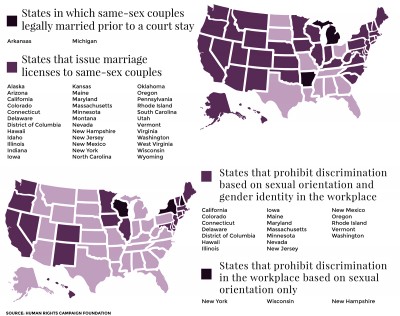In 2004, Massachusetts became the first U.S. state to legalize same-sex marriage, but despite its marriage equality, it is still lacking in some of its non-discrimination laws, according to the 2014 State Equality Index released Friday by the Human Rights Campaign and the Equality Federation.

The report separated states into four categories in terms of progressive legislation. Massachusetts falls in the “Solidifying Equality” group, meaning that the state has marriage equality and some non-discrimination laws, but lacks full protections against discrimination. The most progressive category, “Working Toward Innovative Equality,” was reserved for states with “robust LGBT non-discrimination laws.”
“The purpose of [the study] was to look at the type of laws that affect LGBT equality across the country,” said Alison Gill, Human Rights Campaign senior legislative counsel and author of the State Equality Index.
According to its website, the HRC is the largest civil rights organization promoting equality for lesbian, gay, bisexual and transgender Americans. The Index evaluates statewide laws and policies that affect these communities and is the first of what the Human Rights Campaign plans to be an annual report.
Each state’s scorecard shows whether it has laws regarding LGBT equality in six areas: relationship recognition, parenting laws, non-discrimination laws, hate crimes laws, youth-related laws and health and safety laws.
Gill said shortcomings in the state’s parenting, non-discrimination and youth protection laws have prevented Massachusetts from being placed in the Index’s most progressive category. Gill hopes that lawmakers are able to see where gaps in their own state equality laws lie.
“Massachusetts has always been a leader in marriage equality,” Gill said. “The key piece I’m trying to raise is that despite marriage equality, there are still gaps.”
Chad Griffin, president of the Human Rights Campaign, emphasized the need for further equality for the LGBT community in a Friday press release.
“Despite historic progress on issues like marriage equality, a majority of states still struggle to reach even a basic level of equality for LGBT people … Even worse, equality opponents continue to push deeply harmful laws forward, including those seeking to undermine critical protections in the guise of ‘religious liberty,’” he said in the release.
Laws that undermine LGBT equality are also included on the scorecards. Massachusetts currently has one of these types of laws, a law that does not allow Medicaid to cover costs involving gender transition for transgender people.
Boston Mayor Martin Walsh has a history of promoting LGBT rights. In June 2014, he signed a bill that guarantees all employees of the city of Boston access to transitional procedures for transgender people, The Boston Globe reported on June 11, 2014.
“From day one of this administration, we have been very clear about our commitment to inclusion in Boston,” Walsh said in an email statement. “We are thrilled that Massachusetts received positive reviews in the State Equality Index. In Boston, we believe that everyone deserves to be part of our community and hope that other cities across America can share in our values of inclusion and equity.”
Several residents said the rankings were unexpected because they assumed Massachusetts would have a higher ranking.
Michael Chen, 30, of Brighton, was surprised by the results of the report, and thought Massachusetts had progressed more in terms of LGBT equality.
“It seems like Massachusetts is on the forefront of gay and lesbian rights,” he said. “I’m a little surprised.”
Danny Rabkin, 20, of Boston, said Massachusetts is far ahead of many other states in terms of LGBT equality. He said marriage equality is the most publicized issue, but not necessarily the most important.
“Marriage equality is really in the limelight a lot,” he said. “Overall is it the most important, like if we had to trade everything else for marriage rights? No.”
Nishan Finch, 32, of the North End, came to Boston from San Francisco and said some communities in Boston have struggled more with accepting LGBT rights.
“It’s a little different of a culture,” he said. “In San Francisco, everyone’s grown up with or has someone in the family who’s gay, so it’s more acceptable. [Massachusetts] has got a ways to go.”
This is an account occasionally used by the Daily Free Press editors to post archived posts from previous iterations of the site or otherwise for special circumstance publications. See authorship info on the byline at the top of the page.



